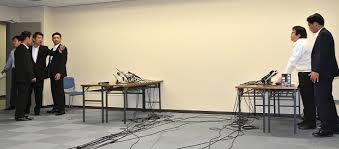 Source: mainichi.jp
Source: mainichi.jp The Zaitokukai mainly focus their attention on schools and associations belonging to North Koreans (or Koreans who affiliate themselves with North Korea for historical reasons) residing in Japan, a situation that stems from the history of social conflict between Koreans transported to Japan during WWII to labour in Japanese industries, but who were unable to return to Korea after the war nor were granted Japanese citizenship, and Japan’s nationalist organisations who resented the presence of the Koreans as foreigners, cheap labour, and a reminder of Japan’s defeat. According to the Zaitokukai, Koreans who have special permanent residency arrangements and who are granted economic and welfare benefits because of their ethnic heritage should have this status overturned and be treated as any other foreign resident in Japan with the same limit on rights and access to services.(J)
Hashimoto Tōru, who himself has admitted to his father’s affiliation with criminal gangs and members of the Burakumin caste in the past, has certainly come into contact with members of the Zainichi (or Koreans resident in Japan) community throughout his life. Whether this had any influence on his reaction to Sakurai’s questioning during last week’s meeting is purely speculative, but given Hashimoto’s comments during the short-lived encounter (scheduled for 30 minutes, the meeting didn’t last 8), he clearly didn’t appreciate Sakurai’s attempts to belittle him over Osaka City’s regulations related to hate speech. Hashimoto certainly came into the room in a combative mood, and Sakurai didn’t disappoint, kicking off his comments with “These (hate-speech related comments) are what you said, aren’t they?”, using the more familiar anata proper noun for “you”, before immediately following it up with o-mae, an even less appropriate manner of address for what was supposed to be a formal meeting (video for their meeting can be found here).
It’s hard to see what the point of this meeting was, given that Sakurai just appeared to want to use it as an opportunity to big-note himself and perhaps advertise his book “The Age of Great Hatred of Koreans”. If you look at this footage before Hashimoto arrived (video here), Sakurai was doing his best to slag off the media who had assembled to report on the meeting (mainly Kyodo Press, the Mainichi Shimbun, and NHK), so clearly he wasn’t going to attempt to debate anything – his purpose was to try and embarrass the mayor. He didn’t succeed, although he did later claim that he “won” the meeting by causing Hashimoto to lose face. Strangely enough, Hashimoto basically told Sakurai to go and make his complaints about hate speech to the federal government, or else stand for election. Either way, it wasn’t an edifying display by either leader.
The following day, Mayor Hashimoto made an even stranger comment, saying in a press conference that there was “a need to streamline the (special residency visa) system along the same lines as other foreigners”, and that “special treatment leads to discrimination”, which for all intents and purposes sounded like Hashimoto was endorsing what Sakurai was yelling the day before (J). It may be that Hashimoto, remembering that his own party were still represented at the federal level, decided that his party’s conservative credentials would be better served by drawing attention to the permanent residency system and its need for an overhaul.
For a mayor who has landed himself in hot water in the past for his comments regarding comfort women (J), this latest performance by Hashimoto (for that’s ultimately what it was) could have been an opportunity to demonstrate that at least on this front, he could be progressive in his attitude towards resident Koreans and the elimination of discriminatory language and actions against minorities. That didn’t happen, and instead Hashimoto appeared to weasel his way out of controversy by tacitly backing the demands of the Zaitokukai. If anything did come of the meeting, it’s the plain fact that attempting to reason with extremists is a futile task as they are not open to changing their minds – they believe what they believe, and the rest be damned. Then again, perhaps Hashimoto knew this from the very beginning and so wanted the public to get a look at what sort of organisation the Zaitokukai is. If this was the case, then kudos to Mayor Hashimoto.
 RSS Feed
RSS Feed